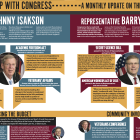Carley Cole, Staff Writer
Ukraine remains in a state of disarray as protestors continue to occupy the streets of Independence Square in the city of Kiev. Protestors began in Nov. of 2013 when President Viktor Yanukovych backed out of a popular trade agreement with the European Union in favor of an agreement with Russia instead. The first protestor deaths took place on Jan. 22 with an exchange of live ammunition between protestors and police. In the following days, the prime minister resigned, and parliament repealed harsh anti- protest laws in an attempt to deescalate the situation.
Following a violent confrontation on Feb. 18, leaving 26 dead and hundreds injured, a truce between the two groups was announced on Feb. 20. Not even hours later, the bloodiest confrontation so far ended with approximately 100 people dead.
KSU student Oksana Grinchuk, originally from Ukraine, is watching the conflict unfold in complete shock and sadness. “It’s easy to see them as violent and rebellious people, but really they are upset and angry,” said Grinchuk. “They are hardworking people who have families and dreams and visions like we all do, but they have experienced much turmoil and little freedom.”
Make-shift bombs laced with shrapnel, live ammunition, and blunt objects are all weapons utilized in the confrontations. The country is divided over whether to pursue stronger relations with the United States and the European Union or Russia. It is reported that much of the opposition believes Yanukovych is running a corrupt government with support from Russian president, Vladimir Putin.
The United States worries that with pressure from Russia, Ukraine will violently intensify its crackdown on the protestors. The U.S. has denied visas to 20 members of the Ukrainian government, and the European Union has imposed sanctions including asset freezes and visa bans on Ukraine.
Ukraine’s parliament recently passed a resolution stating that security forces should stop using live ammunition, retreat from the square, and cease pursuit of the anti-terror operation previously declared by police. There is currently no evidence that Ukrainian military troops have been involved in the conflict. The opposition leader, Vitali Kiltschko, is reportedly negotiating with Yanukovych, but many government officials do not foresee the violence ending anytime soon.
As of Feb. 22, parliament voted to remove Yanukovych from office and to have early elections on May 25. Yanukovych was at first defiant and refused to leave his position; however, Yanukovych has now fled to eastern Ukraine.
Grinchuk described a much different scene than the violent picture being described by American news sources. “Ukraine has a weak government with people that are either very poor or rich,” said Grinchuk. “The government does not support everything the same way American does, so it is easy to judge.”
Grinchuk still has family and close friends in Ukraine, and she says she is patiently awaiting the end to all of this turmoil. “It is so sad to see my home country in such riot and chaos,” stated Grinchuk. “This riot can easily turn into a civil war.” Grinchuk ended the interview with a desperate plea to consistently pray for her country.
“This is not to be just written in ink and shown on the news,” said Grinchuk. “It’s reality [and] real people, even our age, [are] dying for the sake of freedoms that Americans take for granted.”

